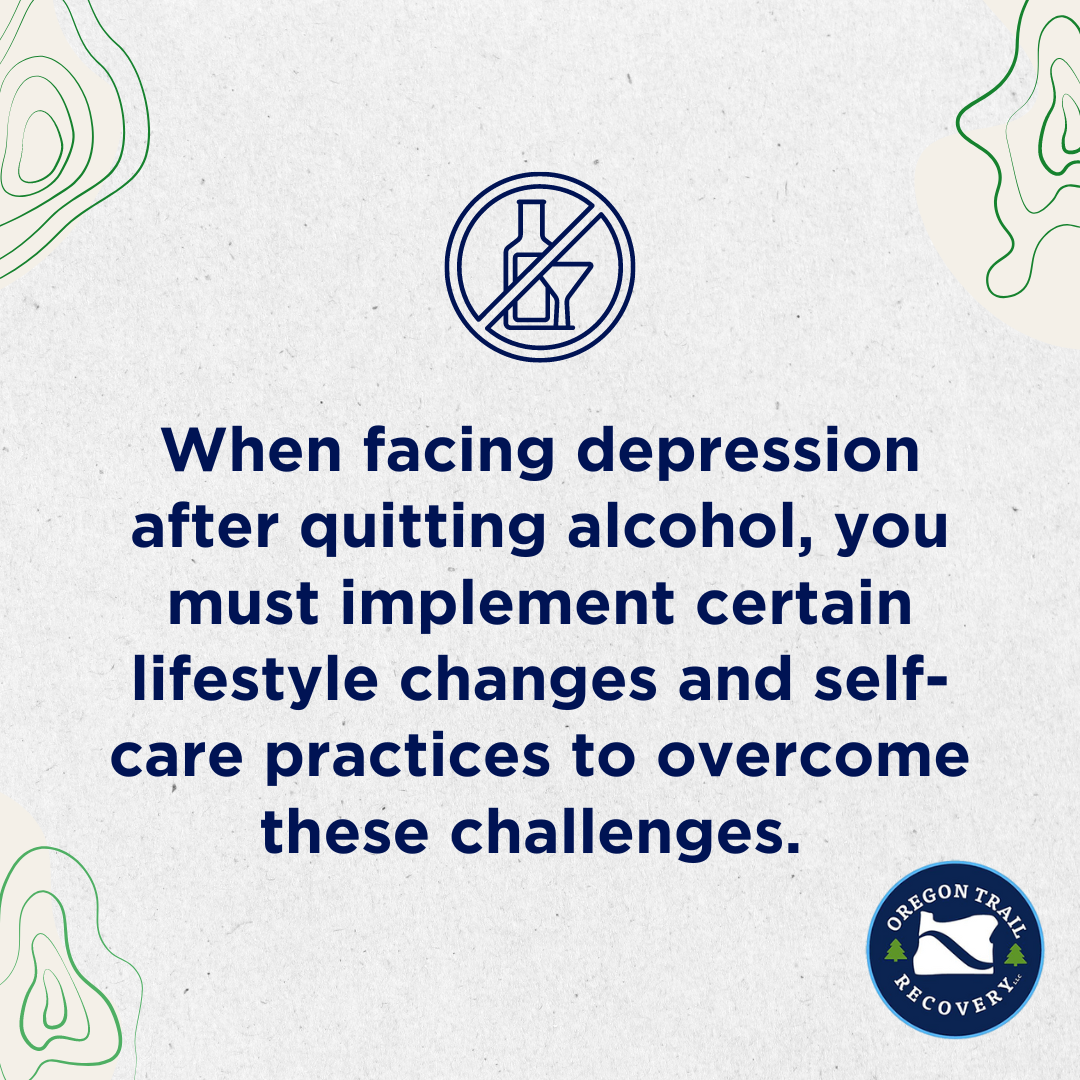
Alcohol use disorder and depression often go hand in hand, and quitting drinking can be an important step toward managing both. However, it's common for individuals to experience depression after quitting drinking.Alcohol-induced depressive disorder refers to a condition where individuals experience depressive-like symptoms, such as sadness or loss of pleasure, only during or shortly after alcohol use or withdrawal. These symptoms improve after 3 to 4 weeks of abstaining from alcohol but can cause significant distress and impairment. In this blog post, we'll explore why this happens and provide tips on how to overcome this.[caption id="attachment_3778" align="aligncenter" width="1080"]

Source: Oregon Trail Recovery[/caption]
Alcohol use and mental health are closely interconnected. Many individuals with alcohol use disorder (AUD) may experience mental health issues, including depression. While alcohol may temporarily alleviate depressive symptoms, it often exacerbates them in the long run.When individuals quit drinking, they may initially experience a range of emotions, including depression. This can be attributed to several factors.Firstly, alcohol is a central nervous system depressant, and the sudden absence of its depressive effects can result in a rebound effect on mood. Additionally, alcohol may have been used as a coping mechanism for underlying emotional issues, and without it, those issues may resurface, leading to depressive feelings.The duration of depression after quitting drinking varies from person to person. Some individuals may experience transient episodes of depression that resolve within a few weeks, while others may endure more persistent symptoms.Patients with alcohol use disorder and depression must seek professional help and engage in healthy coping strategies to manage and overcome depression during this transition period.
After quitting drinking, individuals may experience a range of withdrawal symptoms, which can contribute to feeling "bad" during the initial stages of sobriety. These symptoms may include:
These symptoms, including depression, can persist for a long period, often called the "protracted withdrawal" phase. This phase can go on for weeks to months and varies in intensity and duration depending on individual factors.During this phase, you must seek support from healthcare professionals, therapists, and support groups specializing in addiction recovery. They can provide guidance, coping strategies, and potential treatment options to address post-acute withdrawal's physical and emotional challenges, including depression.[caption id="attachment_3779" align="aligncenter" width="2560"]

Source: Pexels.com[/caption]
When facing depression after quitting alcohol, implementing certain lifestyle changes and self-care practices can greatly contribute to managing and overcoming these challenges. Here are some strategies to consider:
Remember, overcoming depression after quitting alcohol is a journey that requires patience, self-compassion, and support. By implementing these strategies and seeking professional help, you can gradually restore your emotional well-being and thrive in your recovery journey.
Enrolling in treatment for alcohol use disorder (AUD) is crucial for addressing both the physical and mental health aspects of alcohol addiction. Here's why treatment is important:
Treatment begins with a comprehensive assessment by healthcare professionals who specialize in addiction. This evaluation helps determine the severity of the addiction, assess co-occurring mental health conditions, and develop an individualized treatment plan.[caption id="attachment_3780" align="aligncenter" width="1080"]

Source: Oregon Trail Recovery[/caption]
For individuals with severe alcohol dependence, medical detoxification may be necessary to manage withdrawal symptoms safely. Detox is often followed by medical support to address physical and psychological health needs during early recovery.
Treatment for AUD typically involves a combination of evidence-based therapies, such as cognitive-behavioral therapy (CBT), motivational interviewing, and family therapy. These therapeutic interventions help individuals explore and address the underlying causes of their addiction, develop healthy coping mechanisms, and enhance their overall mental well-being.
Sometimes, healthcare professionals may prescribe medications as part of the treatment plan. Medications like naltrexone or acamprosate can help reduce cravings, prevent relapse, and improve mood stability.
Treatment programs provide a supportive and structured environment where individuals can connect with peers in recovery. This sense of community and support can significantly contribute to emotional well-being and reduce feelings of isolation.
Following the completion of a formal treatment program, aftercare support is crucial. This may involve ongoing therapy, participation in support groups like Alcoholics Anonymous (AA), and establishing a relapse prevention plan. Continued support helps individuals maintain sobriety, manage their mental health, and reduce the risk of relapse.[caption id="attachment_3781" align="aligncenter" width="2560"]

Source: Pexels.com[/caption]By getting treatment for AUD, individuals can address their alcohol addiction while simultaneously improving their mental health. Through therapy, support, and medication, individuals can develop effective coping strategies, rebuild their lives, and experience a significant reduction in symptoms of depression.If you are struggling with alcohol addiction and depression, consider contacting Oregon Trail Recovery. Our dedicated team of professionals can provide personalized treatment options, support, and resources to help you on your journey to recovery. Take the courageous step towards a healthier and happier life by seeking the help you deserve.You are not alone, and with the right support, there is hope for a brighter future free from the grips of alcohol and depression.